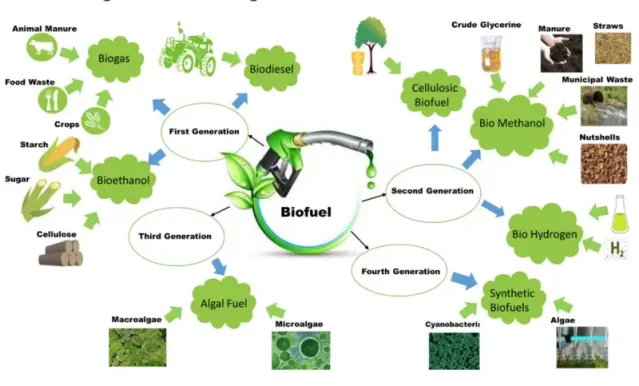
Energy Diversification: Harnessing the Power of Biofuels for Sustainable Development
Introduction
Energy diversification is crucial for achieving sustainable development in today’s world. As global energy demand continues to rise, it becomes increasingly important to explore alternative sources that can reduce our reliance on fossil fuels. One such alternative is biofuels, which have gained prominence in recent years due to their potential in achieving energy diversification. In this article, we will delve into the historical background of biofuels, explore key concepts and definitions, discuss the main benefits and advancements in biofuel production, examine case studies, and address challenges and controversies. By the end, we will have a better understanding of the future outlook for biofuels and their role in energy diversification strategies.
Historical Background
Biofuels have a long history that dates back to ancient civilizations. In early civilizations, biofuels such as firewood and charcoal were widely used for heating and cooking purposes. However, it was during the Industrial Revolution that the modern biofuel industry began to take shape. Key milestones in the development of modern biofuels include the discovery of ethanol as a fuel source in the 19th century and the introduction of biodiesel in the 1930s. These early developments laid the foundation for the widespread use of biofuels in the decades to come.
Key Concepts and Definitions
Biofuels can be broadly defined as fuels derived from renewable biomass, such as plants and organic waste materials. There are different types of biofuels, including first-generation biofuels, which are derived from food crops such as corn and sugarcane, and second-generation biofuels, which are made from non-food feedstocks such as agricultural residues and algae. Energy diversification refers to the process of reducing dependence on a single energy source by incorporating a variety of energy alternatives. The goals of energy diversification include enhancing energy security, reducing greenhouse gas emissions, and promoting sustainable development. Sustainability and environmental considerations play a crucial role in biofuel production to ensure that the benefits outweigh any potential negative impacts.

Main Discussion Points
Economic and energy security benefits of biofuels
Biofuels can significantly reduce dependence on fossil fuel imports, thereby enhancing energy security. By promoting domestic biofuel production, countries can reduce their reliance on foreign oil and create opportunities for local economic growth. The biofuel industry has the potential to stimulate rural economies through job creation and increased agricultural activity.
Environmental advantages and climate change mitigation
One of the main advantages of biofuels is their ability to reduce greenhouse gas emissions compared to fossil fuels. Biofuels have a smaller carbon footprint and can contribute to the transition towards a low-carbon economy. With the growing concern over climate change, biofuels offer a viable solution to mitigate the environmental impact of transportation and other sectors.
Technological advancements and innovation in biofuel production
The development of new feedstocks and conversion technologies has revolutionized biofuel production. Researchers are exploring alternative feedstocks such as algae and waste biomass, which have the potential to significantly increase biofuel yields. These technological advancements not only improve the efficiency of biofuel production but also foster innovation and create new industries.

Case Studies or Examples
Several countries and regions have successfully implemented biofuels for energy diversification. For example, Brazil has been a pioneer in the production of bioethanol derived from sugarcane, which accounts for a significant portion of their transportation fuel. The United States has also made significant progress in biofuel production, particularly in the form of corn-based ethanol. These case studies highlight the potential of biofuels to contribute to energy diversification and promote sustainable development.
Current Trends or Developments
Recent research has focused on improving the efficiency and sustainability of biofuel production. Scientists are exploring ways to increase the yield of biofuels from various feedstocks while minimizing the use of water and other resources. Additionally, there is an increasing use of biofuels in the transportation sector, with aviation and shipping industries incorporating biofuel blends into their operations. The integration of biofuels with other renewable energy sources, such as wind and solar power, provides a more diversified and sustainable energy mix.
Challenges or Controversies
While biofuels offer numerous benefits, there are also challenges and controversies surrounding their production and use. Concerns include land use change and competition with food production, as some biofuel feedstocks require agricultural land that could otherwise be used for food crops. Additionally, the environmental impacts of biofuel production, such as deforestation and water pollution, need to be carefully managed to ensure sustainability. There are differing viewpoints on the effectiveness and feasibility of biofuels for energy diversification, with critics questioning their overall impact on reducing greenhouse gas emissions.

Future Outlook
The future role of biofuels in energy diversification strategies is promising. As technology continues to advance, biofuel production is expected to become more efficient and sustainable. Ongoing research and development efforts focus on improving feedstock availability, conversion technologies, and the overall environmental performance of biofuels. Policy and market incentives will play a crucial role in encouraging further adoption of biofuels, ensuring their integration into the energy mix of the future.
Conclusion
Biofuels have emerged as a viable solution in the pursuit of energy diversification. Their economic, environmental, and technological advantages make them a promising alternative to fossil fuels. However, it is essential to continue research, innovation, and policy support to fully harness the potential of biofuels in achieving sustainable development. By embracing biofuels, we can reduce our dependence on fossil fuels, mitigate climate change, and pave the way for a greener and more sustainable future.
References
Smith, P., et al. (2016). Biophysical and economic limits to negative CO2 emissions. Nature Climate Change, 6(1), 42-50.
Shamsuddin, M. R., et al. (2019). Overview and evaluation of biofuels from lignocellulosic biomass. Renewable Energy, 132, 1131-1140.
Demirbas, A. (2007). Importance of biofuels for future energy demands. Energy Conversion and Management, 49(9), 2740-2751.
Balat, M., & Balat, H. (2009). Recent trends in global production and utilization of bio-ethanol fuel. Applied Energy, 86(11), 2273-2282.
Macedo, I. C., et al. (2008). Greenhouse gases emissions in the production and use of ethanol from sugarcane in Brazil: The 2005/2006 averages and a prediction for 2020. Biomass and Bioenergy, 32(7), 582-595.




